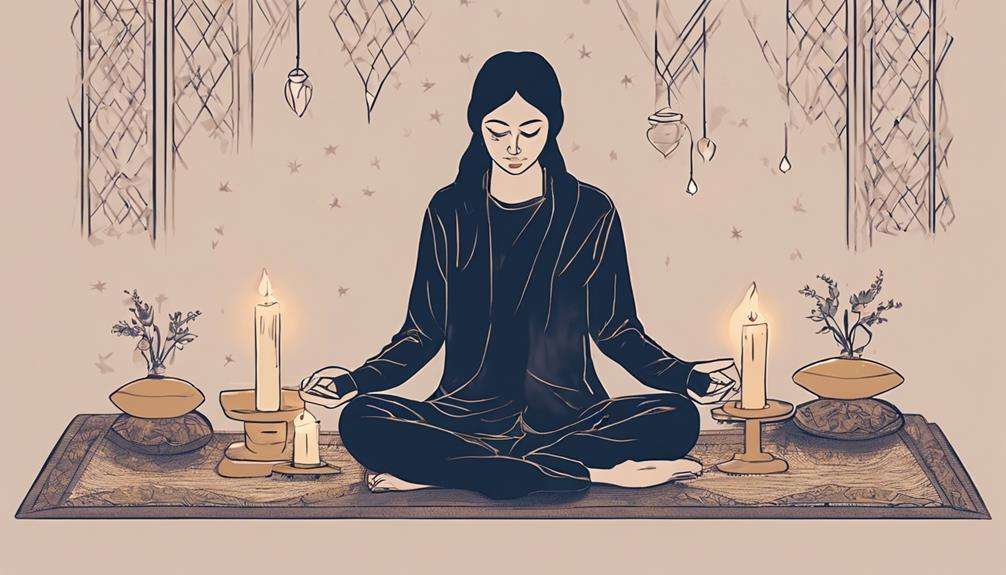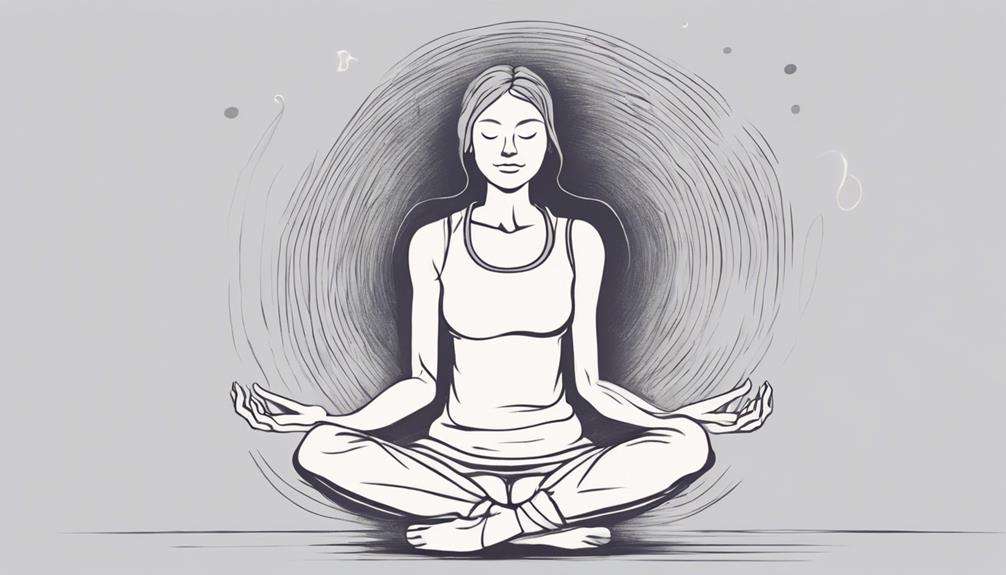Imagine a world where chronic pain is not just endured but managed effectively through a practice that taps into your mind's own healing abilities.
The power of meditation in alleviating persistent pain is a topic that raises intriguing questions about the mind-body connection and the potential for transformative relief.
As you consider the impact of meditation on chronic pain, a deeper exploration into the mechanisms behind this age-old practice might uncover a path towards a more comfortable existence.
Key Takeaways
- Meditation reduces chronic pain intensity and enhances coping mechanisms.
- Mind-body techniques improve overall well-being and quality of life.
- Neurological changes from meditation increase pain thresholds and activate brain regions for relief.
- Enhanced mind-body connection through meditation helps control pain responses effectively.
How Meditation Eases Chronic Pain
By alleviating stress, anxiety, and worry associated with chronic pain, meditation offers a powerful tool for managing and reducing the impact of this persistent condition on your daily life. Chronic pain, especially conditions like chronic low back pain, can significantly disrupt your routine and diminish your quality of life. Through the practice of mindfulness and meditation, you can find relief from the constant discomfort that plagues you.
Research has shown that meditation not only helps in reducing stress but also plays a crucial role in changing the structure of the brain, ultimately decreasing pain sensitivity. By engaging in meditation regularly, you can train your mind to better cope with the sensations of pain, thereby lessening its grip on your body. This shift in brain function can lead to enhanced pain management and an overall improvement in your well-being. Embracing meditation as part of your pain management strategy can empower you to take control over your chronic pain and lead a more fulfilling life.
Mind-Body Connection in Pain Management
Understanding the mind-body connection is crucial in managing chronic pain. Your thoughts and emotions can significantly influence how you perceive and experience pain.
Through meditation, you can learn techniques to better control your pain responses and enhance your overall well-being.
Pain Perception and Emotions
The intricate interplay between your emotions and pain perception forms a vital component of the mind-body connection crucial for effective chronic pain management. Emotions and thoughts can significantly impact how you experience pain, either intensifying or lessening its effects.
The anterior cingulate cortex (ACC) and prefrontal cortex (PFC) are key brain regions that evaluate and process pain signals, influencing your overall perception. Cognitive aspects such as expectations, conditioning, and mood also play a substantial role in shaping your response to pain.
Moreover, endogenous opioidergic mechanisms can modulate pain relief through cognitive techniques like placebo effects and hypnosis. Understanding and managing these emotional and cognitive factors are essential steps in finding relief and improving your quality of life amidst chronic pain.
Techniques for Pain
Exploring various mind-body techniques, such as meditation, can empower individuals in effectively managing chronic pain by fostering stress reduction and promoting relaxation.
Mindfulness meditation, a key component of pain management, can help reduce pain intensity by influencing neural mechanisms involved in pain perception. By engaging in meditation practices, individuals can positively impact brain activity related to pain processing.
This holistic approach to chronic pain management not only addresses the physical aspects of pain but also the emotional components, ultimately enhancing overall quality of life.
Embracing mind-body techniques like meditation offers a powerful tool in the journey towards alleviating chronic pain and reducing its impact on daily life.
Meditation for Pain
To effectively manage chronic pain and enhance your overall quality of life, harnessing the mind-body connection through mindfulness meditation is a powerful tool.
Mindfulness meditation has been shown to reduce pain intensity and suffering by engaging brain mechanisms that alter the perception of pain. Techniques such as body scanning and breathwork enable individuals to focus on specific areas of discomfort, bringing relief and relaxation.
This nonpharmacological approach is recommended by the CDC for its proven efficacy in pain management. By activating specific brain regions involved in pain processing, meditation offers a holistic way to address chronic pain.
Embracing mindfulness meditation as a regular practice can empower you to take control of your pain and improve your well-being.
Neurological Benefits of Meditation
Inducing profound changes in neural pathways, meditation offers tangible benefits for managing chronic pain through its impact on brain function. By delving into the neurological aspects of meditation, you can better understand how this practice can alleviate your chronic pain:
- Studies reveal that meditation can activate specific brain areas related to pain self-control, ultimately reducing your perception of pain.
- Research demonstrates that individuals who meditate regularly exhibit higher pain thresholds in comparison to those who don't practice meditation.
- Engaging in mindfulness meditation can induce structural changes in the brain, significantly diminishing chronic pain over time.
- Through meditation, certain brain activations are triggered, showing promising results in alleviating persistent pain experienced by chronic pain patients.
- Meditation has the ability to inhibit brain regions associated with pain perception, leading to effective pain relief.
Embracing meditation as a tool for managing chronic pain can empower you to tap into these neurological benefits for a healthier, more balanced life.
Techniques for Pain Relief Through Meditation

By incorporating specific meditation techniques, you can effectively alleviate chronic pain and enhance your overall well-being. Visualization meditation helps reduce the mind's perception of pain by creating peaceful mental images, offering a reprieve from discomfort.
Body scan meditation systematically relaxes each body part, releasing tension and providing relief from chronic pain. Mindful breathing activates the body's relaxation response during meditation, reducing pain and promoting a sense of calm.
Loving-kindness meditation fosters compassion and patience, alleviating emotional stresses often associated with chronic pain. Guided meditation sessions, led by experienced practitioners, effectively shift your focus away from pain, enhancing the overall pain relief experience.
These techniques, such as mindfulness meditation, not only target the physical sensations of pain but also address the emotional and mental aspects, providing a holistic approach to managing chronic pain and promoting relaxation. Incorporating these practices into your routine can lead to significant improvements in your well-being and quality of life.
Impact of Mindfulness on Chronic Pain
How does mindfulness meditation impact chronic pain management and overall well-being? Mindfulness practices have a profound effect on chronic pain by reducing pain intensity and improving overall quality of life.
Here are five ways mindfulness can positively influence chronic pain:
- Mindfulness meditation has been shown to significantly reduce pain intensity, providing relief for individuals suffering from chronic pain.
- Mindfulness-based treatments can lower pain interference, helping individuals better cope with their pain and improve their daily functioning.
- Regular practice of mindfulness empowers individuals to take control over their pain, leading to an enhanced sense of well-being.
- Mindfulness-based therapies have proven effective in reducing pain intensity and enhancing the overall quality of life for those with chronic pain conditions.
- Research suggests that mindfulness meditation can increase pain tolerance, indicating its potential to alleviate suffering and improve mental well-being.
Embrace mindfulness to experience the transformative impact it can have on chronic pain management and your overall quality of life.
Meditation Practices for Pain Alleviation

Mindfulness meditation offers a powerful tool for alleviating chronic pain by providing techniques that address pain perception and management. Visualization practices in meditation can help reduce the mind's perception of pain by creating calming mental images.
Body scan meditation is another effective technique that aids in managing chronic pain by identifying tension in different body parts. Engaging in mindful breathing techniques can activate the body's relaxation response, ultimately leading to a decrease in pain levels.
Additionally, guided meditations, especially those led by experienced practitioners, can shift focus away from pain and enhance relaxation. Studies have shown that individuals who practice meditation have higher pain thresholds compared to non-meditators, indicating the pain-relieving effects of meditation.
Integrating Meditation Into Pain Management
As you explore integrating meditation into your pain management routine, you'll discover the numerous benefits it offers, such as stress reduction, improved sleep, and overall well-being enhancement.
By starting with short meditation sessions and gradually increasing their length, you can effectively incorporate this practice into your pain management strategy.
Focusing on comfortable postures and breathing techniques during meditation can help you cultivate a stronger mind-body connection to better manage chronic pain.
Benefits of Meditation
Curious about the benefits of integrating meditation into your chronic pain management routine? Here are some key advantages to consider:
- Stress Reduction: Meditation can lessen stress and worry associated with chronic pain, promoting calmness.
- Improved Quality of Life: Integrating meditation into pain management can enhance overall well-being and quality of life.
- Pain Relief: Meditation techniques like mindfulness can help reduce pain intensity and improve coping mechanisms.
- Enhanced Relaxation: Regular meditation practice can lead to increased relaxation and a sense of inner peace.
- Effective Pain Management: Using various meditation techniques such as mantras, movement, visualization, and body scans can assist in effectively managing chronic pain.
Techniques for Pain
When managing chronic pain, integrating meditation techniques can offer effective relief and support in your pain management journey. Mindfulness meditation, like body scan meditation, promotes relaxation and eases tension in your body.
By focusing on mindful breathing during meditation, you can activate your body's relaxation response, which aids in pain relief. Visualization practices such as guided imagery can help divert your attention away from the pain, enhancing relaxation.
Regular meditation practice not only improves your pain tolerance but also enhances your overall well-being when dealing with chronic pain. These meditation techniques can reduce the need for relying heavily on medications and provide you with a holistic approach to managing your pain effectively.
Mind-Body Connection
Integrating meditation techniques into your pain management routine offers a powerful way to enhance the mind-body connection and promote effective relief from chronic pain. Mindfulness meditation, a key practice in pain management, helps you become more aware of your pain and learn to manage it effectively.
Mind-body techniques like meditation can reduce stress, shifting your focus away from pain sensations and promoting relaxation. By incorporating meditation into your pain management, you may experience reduced pain perception and increased emotional resilience.
The meditation benefits extend beyond pain relief, contributing to improved overall well-being. Give yourself the gift of mindfulness meditation to empower yourself in the journey towards managing chronic pain more effectively.
Frequently Asked Questions
Can Meditation Heal Chronic Pain?
Meditation can help manage chronic pain by enhancing the mind-body connection through mindfulness techniques. It offers pain relief, a holistic approach to chronic conditions, and self-care. Breathing exercises and mindfulness practices are effective alternative therapies for pain management.
What Do You Do When Your Chronic Pain Is Unbearable?
When your chronic pain feels unbearable, focus on pain management. Try coping strategies like deep breathing, visualization, and mindfulness. Engage in alternative therapies and self-care practices. Build a support network and prioritize your well-being.
What Type of Meditation Is Best for Pain?
For pain relief, mindfulness practice offers a powerful tool. Through guided meditation, body scan, and visualization techniques, you can bring soothing relief. Embrace breath awareness, movement meditation, and progressive relaxation for a holistic approach to healing.
How Much Pain Can Be Reduced Using Meditation?
You can reduce pain significantly through meditation, tapping into the mind-body connection. Meditation techniques alter pain perception, enhancing pain relief and management. Mindfulness, breathing exercises, and guided imagery increase pain tolerance while reducing stress.
Conclusion
As you close your eyes and visualize a peaceful garden, imagine the gentle breeze soothing your body, melting away the tension and pain.
Through the power of meditation, you can cultivate a sense of calm and resilience, allowing you to navigate the challenges of chronic pain with grace and strength.
Embrace the healing potential of meditation, harnessing the mind-body connection to find relief and improve your quality of life.
You deserve to experience peace and comfort amidst the storm.






